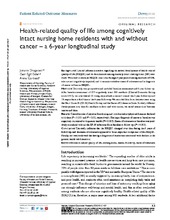Health-related quality of life among cognitively intact nursing home residents with and without cancer – a 6 year longitudinal study
Peer reviewed, Journal article
Published version

Åpne
Permanent lenke
https://hdl.handle.net/1956/18211Utgivelsesdato
2017-04-27Metadata
Vis full innførselSamlinger
Originalversjon
https://doi.org/10.2147/prom.s125500Sammendrag
Background: Limited information exists regarding the natural development of health-related quality of life (HRQOL) and its determinants among mentally intact nursing home (NH) residents. We aimed to examine HRQOL over time during a 6-year period among residents of NHs, who are not cognitively impaired, and to examine whether sense of coherence and a diagnosis of cancer influence HRQOL. Methods: The study was prospective and included baseline assessment and 6-year follow-up. After baseline assessment of 227 cognitively intact NH residents (Clinical Dementia Rating score ≤ 0.5), we interviewed 52 living respondents a second time at the 5-year follow-up and 18 respondents a third time at the 6-year follow-up. We recorded data from the interviews using the Short Form-36 (SF-36) Health Survey and the Sense of Coherence Scale. To study different developments over time for residents without and with cancer, we tested interactions between cancer and time. Results: The subscores of physical functioning and role limitation–physical domains declined with time (P < 0.001 and P = 0.02, respectively). Having a diagnosis of cancer at baseline was negatively correlated with general health (P = 0.002). Sense of coherence at baseline was positively correlated with all the SF-36 subscores from baseline to follow-up (P < 0.001). Conclusion: The study indicates that the HRQOL changed over time during the 6 years of follow-up, and the sense of coherence appeared to be an important component of the HRQOL. Finally, our results showed that having a diagnosis of cancer was associated with decline in the general health subdimension.
